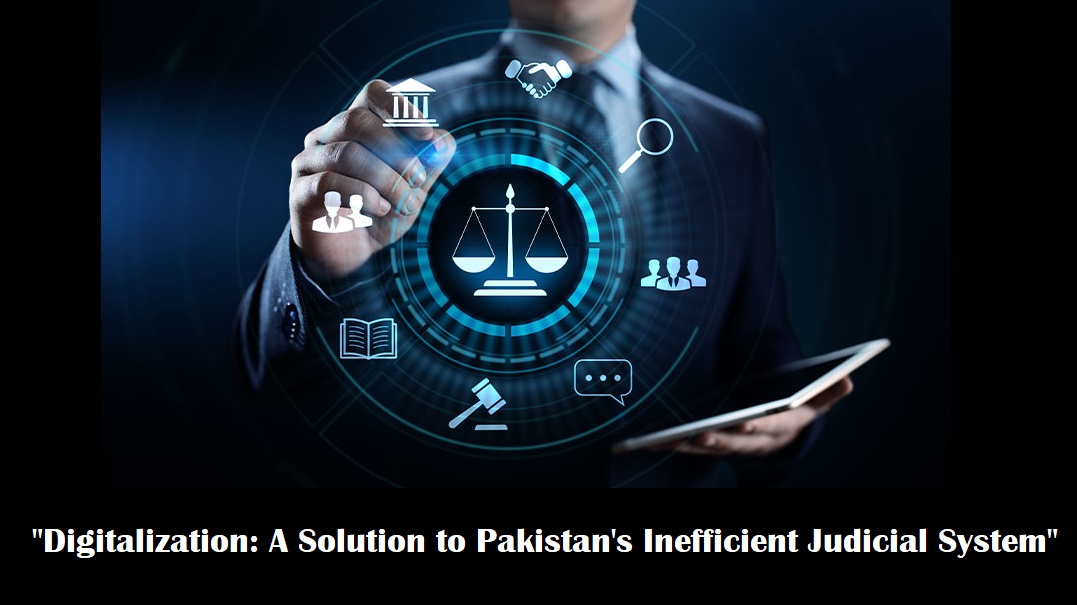Digitalization: A Solution to Pakistan’s Inefficient Judicial System
Digitalization could speed up the legal process in Pakistan and give the courts the transparency they need

The judicial system is one of the most fundamental foundations of society, and it is in dire need of technological improvements. It should come as no surprise that our court system fails to produce satisfying outcomes. Political influence, outdated rules, and corruption are all structural concerns that demand immediate action, but we must also implement contemporary solutions and a technologically-based method to track the handling of cases and improve the system’s efficiency. This might be the initial step toward overhauling and digitalization of Pakistan’s judicial system.
The slow pace of the judicial system is one of Pakistan’s most significant issues. In 2010, there were 1.5 million pending cases and 2.6 million new cases filed in our courts. In 2021, the number of pending cases climbed to 2.2 million, while 38.5 million new cases were initiated. There are around 5,000 judges in Pakistan, and it is highly unlikely that they could handle the country’s case backlog in a reasonable amount of time. Although the problem with our judicial system is not confined to a lack of capacity, it is rather the need for more system accountability. In this regard, technology is crucial. If this objective is achieved, the entire system will flourish.
The Digitalization of Pakistan’s Judiciary System: Prospects and Challenges
Some of the factors that result in delayed justice are a bad case management system, the absence of technology to monitor the progress of cases, uncontrolled adjournments and strikes, a lack of training for judges, and a lack of communication between the three levels of the court. In the absence of a technological system to monitor the processing of cases, it is not surprising that the performance of our judicial system is inadequate.
The Global Legal Tech Report 2021–2022 says that data security, big data, Bitcoin, computable contracts, legal help web, digital technology, outcome prediction, machine learning, legal analytics, mobile computing, data mining, electronic document-management systems, virtual law firms, online dispute resolution, electronic courts and e-filing of court documents, and cloud computing are changing the way traditional legal work is done.
So, digitalization could speed up the legal process in Pakistan and give the courts the transparency they need. In a traditional paper-based system, judicial procedures can be time-consuming, inefficient, and prone to errors. By digitizing court records and procedures, courts can reduce the time and cost of handling cases and improve the accuracy and accessibility of court records.
Digitalization can also enhance transparency in the judicial system by making court proceedings more visible and accessible to the public. This can increase public trust in the judicial system, reduce corruption, and enhance the quality of justice delivered.
In Pakistan, the government has started projects like the E-Court project and the National Judicial Automation Program (NJAP) to digitize the court system. But there are still some problems with digitizing Pakistan’s judicial system, such as the need for good infrastructure, trained staff, and data security measures. It is important for the government and stakeholders to address these challenges and ensure that digitalization is implemented in a way that maximizes its benefits and minimizes its risks.
Only through significant structural and institutional reforms will we be able to reduce delays in the administration of justice and, in turn, improve our economy. Leaders in the justice system must protect and build trust by instituting systemic reforms that render their organizations and procedures more transparent, accountable, ethical, just, accessible, affordable, and equitable for all.
Digitalization has the ability to expedite judicial procedures and provide courts with much-needed transparency. Increasing productivity ought to promote legal clarity. There will be strict adherence to deadlines, expenses will be kept to a minimum, and many difficult activities may be done using more or less automated methods. Hence, centuries-old behaviors must be adjusted, despite the fact that old habits die hard.
ALSO READ: A New NADRA Service “Ijazat Aap Ki” Aims To Create Digital Consent Regime
PTA Taxes Portal
Find PTA Taxes on All Phones on a Single Page using the PhoneWorld PTA Taxes Portal
Explore NowFollow us on Google News!





